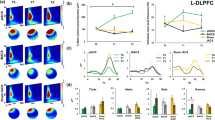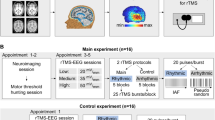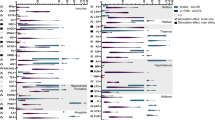Abstract
Repetitive transcranial magnetic stimulation (rTMS) appears capable of modulating human cortical excitability beyond the duration of the stimulation train. However, the basis and extent of this “off-line” modulation remains unknown. In a group of anesthetized cats, we applied patterns of real or sham focal rTMS to the visuo-parietal cortex (VP) at high (HF) or low (LF) frequency and recorded brain glucose uptake during (on-line), immediately after (off-line), or 1 h after (late) stimulation. During the on-line period LF and HF rTMS induced a significant relative reduction of 14C-2DG uptake in the stimulated VP cortex and tightly linked cortical and subcortical structures (e.g. the superficial superior colliculus, the pulvinar, and the LPl nucleus) with respect to homologue areas in the unstimulated hemisphere. During the off-line period HF rTMS induced a significant relative increase in 14C-2DG uptake in the targeted VP cortex, whereas LF rTMS generated the opposite effect, with only mild network impact. Moderate distributed effects were only recorded after LF rTMS in the posterior thalamic structures. No long lasting cortical or subcortical effects were detected during the late period. Our findings demonstrate opposite modulation of rTMS on local and distant effects along a specific network, depending on the pattern of stimulation. Such effects are demonstrated in the anesthetized animal, ruling out behavioral and non-specific reasons for the differential impact of the stimulation. The findings are consistent with previous differential electrophysiological and behavioral effects of low and high frequency rTMS patterns and provide support to uses of rTMS in neuromodulation.




Similar content being viewed by others
References
Amassian VE, Quirk GJ, Stewart M (1990) A comparison of corticospinal activation by magnetic coil and electrical stimulation of monkey motor cortex. Electroencephalogr Clin Neurophysiol 77:390–401
Aydin-Abidin S, Moliadze V, Eysel UT, Funke K (2006) Effects of repetitive TMS on visually evoked potentials and EEG in the anesthetized cat: dependence on stimulus frequency and train duration. J Physiol 574:443–455
Bestmann S, Baudewig J, Siebner HR, Rothwell JC, Frahm J (2003) Subthreshold high-frequency TMS of human primary motor cortex modulates interconnected frontal motor areas as detected by interleaved fMRI–TMS. Neuroimage 20:1685–1696
Bestmann S, Baudewig J, Siebner HR, Rothwell JC, Frahm J (2004) Functional MRI of the immediate impact of transcranial magnetic stimulation on cortical and subcortical motor circuits. Eur J Neurosci 19:1950–1962
Buhl EH, Singer W (1989) The callosal projection in cat visual cortex as revealed by a combination of retrograde tracing and intracellular injection. Exp Brain Res 75:470–476
Castro-Alamancos MA, Donoghue JP, Connors BW (1995) Different forms of synaptic plasticity in somatosensory and motor areas of the neocortex. J Neurosci 15:5324–5333
Chen R, Classen J, Gerloff C, Celnik P, Wassermann EM, Hallett M, Cohen LG (1997) Depression of motor cortex excitability by low-frequency transcranial magnetic stimulation. Neurology 48:1398–1403
Chouinard PA, Van Der Werf YD, Leonard G, Paus T (2003) Modulating neural networks with transcranial magnetic stimulation applied over the dorsal premotor and primary motor cortices. J Neurophysiol 90:1071–1083
Civardi C, Cantello R, Asselman P, Rothwell JC (2001) Transcranial magnetic stimulation can be used to test connections to primary motor areas from frontal and medial cortex in humans. Neuroimage 14:1444–1453
Fox P, Ingham R, George MS, Mayberg H, Ingham J, Roby J, Martin C, Jerabek P (1997) Imaging human intra-cerebral connectivity by PET during TMS. Neuroreport 8:2787–2791
Galuske RA, Schmidt KE, Goebel R, Lomber SG, Payne BR (2002) The role of feedback in shaping neural representations in cat visual cortex. Proc Natl Acad Sci USA 99:17083–17088
Gangitano M, Valero-Cabré A, Tormos JM, Mottaghy FM, Romero JR, Pascual-Leone A (2002) Modulation of input–output curves by low and high frequency repetitive transcranial magnetic stimulation of the motor cortex. Clin Neurophysiol 113:1249–1257
Ganis G, Keenan JP, Kosslyn SM, Pascual-Leone A (2000) Transcranial magnetic stimulation of primary motor cortex affects mental rotation. Cereb Cortex 10:175–180
Gerschlager W, Christensen LO, Bestmann S, Rothwell JC (2002) rTMS over the cerebellum can increase corticospinal excitability through a spinal mechanism involving activation of peripheral nerve fibres. Clin Neurophysiol 113:1435–1440
Gonzalez-Lima F (1992) Brain imaging of auditory functions in cats: studies with fluoroxyglucose autoradiography and cytochrome oxidase histochemistry. In: Gonzalez-Lima F, Finkenstaedt T, Scheich H (eds) Advances in metabolic mapping techniques for brain imaging of behavioral and learning functions. Kluwer, Dordrecht, pp 39–109
Harting JK, Updyke BV, Van Lieshout DP (1992) Corticotectal projections in the cat: anterograde transport studies of twenty-five cortical areas. J Comp Neurol 324:379–414
Hayashi T, Ohnishi T, Okabe S, Teramoto N, Nonaka Y, Watabe H, Imabayashi E, Ohta Y, Jino H, Ejima N, Sawada T, Iida H, Matsuda H, Ugawa Y (2004) Long-term effect of motor cortical repetitive transcranial magnetic stimulation [correction]. Ann Neurol 56:77–85
Hilgetag CC, Theoret H, Pascual-Leone A (2001) Enhanced visual spatial attention ipsilateral to rTMS-induced ‘virtual lesions’ of human parietal cortex. Nat Neurosci 4:953–957
Huang YZ, Edwards MJ, Rounis E, Bhatia KP, Rothwell JC (2005) Theta burst stimulation of the human motor cortex. Neuron 45:201–206
Ikeda H, Wright MJ (1974) Sensitivity of neurones in visual cortex (area 17) under different levels of anaesthesia. Exp Brain Res 20:471–484
Iyer MB, Schleper N, Wassermann EM (2003) Priming stimulation enhances the depressant effect of low-frequency repetitive transcranial magnetic stimulation. J Neurosci 23:10867–10872
Kanaseki T, Sprague JM (1974) Anatomical organization of pretectal nuclei and tectal laminae in the cat. J Comp Neurol 158:319–337
Kennedy C, Des Rosiers MH, Jehle JW, Reivich M, Sharpe F, Sokoloff L (1975) Mapping of functional neural pathways by autoradiographic survey of local metabolic rate with (14C)deoxyglucose. Science 187:850–853
Kobayashi M, Pascual-Leone A (2003) Transcranial magnetic stimulation in neurology. Lancet Neurol 2:145–156
Lee L, Siebner HR, Rowe JB, Rizzo V, Rothwell JC, Frackowiak RS, Friston KJ (2003) Acute remapping within the motor system induced by low-frequency repetitive transcranial magnetic stimulation. J Neurosci 23:5308–5318
Lomber SG, Payne BR, Hilgetag CC, Rushmore J (2002) Restoration of visual orienting into a cortically blind hemifield by reversible deactivation of posterior parietal cortex or the superior colliculus. Exp Brain Res 142:463–474
Lowel S (2002) 2-deoxyglucose architecture of the cat primary visual cortex. In: Payne B, Peters A (eds) The cat primary visual cortex. Academic, San Diego, pp 167–189
Maeda F, Keenan JP, Tormos JM, Topka H, Pascual-Leone A (2000) Modulation of corticospinal excitability by repetitive transcranial magnetic stimulation. Clin Neurophysiol 111:800–805
Moliadze V, Zhao Y, Eysel U, Funke K (2003) Effect of transcranial magnetic stimulation on single-unit activity in the cat primary visual cortex. J Physiol 553:665–679
Moliadze V, Giannikopoulos D, Eysel UT, Funke K (2005) Paired-pulse transcranial magnetic stimulation protocol applied to visual cortex of anaesthetized cat: effects on visually evoked single-unit activity. J Physiol 566:955–965
Mottaghy FM, Pascual-Leone A, Kemna LJ, Topper R, Herzog H, Muller-Gartner HW, Krause BJ (2003) Modulation of a brain-behavior relationship in verbal working memory by rTMS. Brain Res Cogn Brain Res 15:241–249
Munchau A, Bloem BR, Irlbacher K, Trimble MR, Rothwell JC (2002) Functional connectivity of human premotor and motor cortex explored with repetitive transcranial magnetic stimulation. J Neurosci 22:554–561
Okabe S, Hanajima R, Ohnishi T, Nishikawa M, Imabayashi E, Takano H, Kawachi T, Matsuda H, Shiio Y, Iwata NK, Furubayashi T, Terao Y, Ugawa Y (2003) Functional connectivity revealed by single-photon emission computed tomography (SPECT) during repetitive transcranial magnetic stimulation (rTMS) of the motor cortex. Clin Neurophysiol 114:450–457
Palmer LA, Rosenquist AC, Tusa RJ (1978) The retinotopic organization of lateral suprasylvian visual areas in the cat. J Comp Neurol 177:237–256
Pascual-Leone A, Gomez-Tortosa E, Grafman J, Alway D, Nichelli P, Hallett M (1994) Induction of visual extinction by rapid-rate transcranial magnetic stimulation of parietal lobe. Neurology 44:494–498
Pascual-Leone A, Tormos JM, Keenan J, Tarazona F, Canete C, Catala MD (1998) Study and modulation of human cortical excitability with transcranial magnetic stimulation. J Clin Neurophysiol 15:333–343
Pascual-Leone ADN, Wassermann EM, Rothwell J, Puri BK (2001) Handbook of transcranial magnetic stimulation. Arnold, London
Paus T, Jech R, Thompson CJ, Comeau R, Peters T, Evans AC (1997) Transcranial magnetic stimulation during positron emission tomography: a new method for studying connectivity of the human cerebral cortex. J Neurosci 17:3178–3184
Paus T, Jech R, Thompson CJ, Comeau R, Peters T, Evans AC (1998) Dose-dependent reduction of cerebral blood flow during rapid-rate transcranial magnetic stimulation of the human sensorimotor cortex. J Neurophysiol 79:1102–1107
Payne BR (1994) Neuronal interactions in cat visual cortex mediated by the corpus callosum. Behav Brain Res 64:55–64
Payne BR, Lomber SG (1999) A method to assess the functional impact of cerebral connections on target populations of neurons. J Neurosci Methods 86:195–208
Payne BR, Lomber SG (2003) Quantitative analyses of principal and secondary compound parieto-occipital feedback pathways in cat. Exp Brain Res 152:420–433
Payne BR, Rushmore RJ (2004) Functional circuitry underlying natural and interventional cancellation of visual neglect. Exp Brain Res 154:127–153
Payne BR, Siwek DF, Lomber SG (1991) Complex transcallosal interactions in visual cortex. Vis Neurosci 6:283–289
Payne BR, Lomber SG, Villa AE, Bullier J (1996) Reversible deactivation of cerebral network components. Trends Neurosci 19:535–542
Payne BR, Lomber SG, Rushmore RJ, Pascual-Leone A (2003) Cancellation of visuoparietal lesion-induced spatial neglect. Exp Brain Res 150:395–398
Peinemann A, Reimer B, Loer C, Quartarone A, Munchau A, Conrad B, Siebner HR (2004) Long-lasting increase in corticospinal excitability after 1800 pulses of subthreshold 5 Hz repetitive TMS to the primary motor cortex. Clin Neurophysiol 115:1519–1526
Robertson EM, Theoret H, Pascual-Leone A (2003) Studies in cognition: the problems solved and created by transcranial magnetic stimulation. J Cogn Neurosci 15:948–960
Robertson EM, Tormos JM, Maeda F, Pascual-Leone A (2001) The role of the dorsolateral prefrontal cortex during sequence learning is specific for spatial information. Cereb Cortex 11:628–635
Romero JR, Anschel D, Sparing R, Gangitano M, Pascual-Leone A (2002) Subthreshold low frequency repetitive transcranial magnetic stimulation selectively decreases facilitation in the motor cortex. Clin Neurophysiol 113:101–107
Roth BJ, Saypol JM, Hallett M, Cohen LG (1991) A theoretical calculation of the electric field induced in the cortex during magnetic stimulation. Electroencephalogr Clin Neurophysiol 81:47–56
Rounis E, Lee L, Siebner HR, Rowe JB, Friston KJ, Rothwell JC, Frackowiak RS (2005) Frequency specific changes in regional cerebral blood flow and motor system connectivity following rTMS to the primary motor cortex. Neuroimage 26:164–176
Schoppmann A, Stryker MP (1981) Physiological evidence that the 2-deoxyglucose method reveals orientation columns in cat visual cortex. Nature 293:574–576
Siebner HR, Rothwell J (2003) Transcranial magnetic stimulation: new insights into representational cortical plasticity. Exp Brain Res 148:1–16
Siebner HR, Takano B, Peinemann A, Schwaiger M, Conrad B, Drzezga A (2001) Continuous transcranial magnetic stimulation during positron emission tomography: a suitable tool for imaging regional excitability of the human cortex. Neuroimage 14:883–890
Siebner HR, Willoch F, Peller M, Auer C, Boecker H, Conrad B, Bartenstein P (1998) Imaging brain activation induced by long trains of repetitive transcranial magnetic stimulation. Neuroreport 9:943–948
Sokoloff L, Reivich M, Kennedy C, Des Rosiers MH, Patlak CS, Pettigrew KD, Sakurada O, Shinohara M (1977) The [14C]deoxyglucose method for the measurement of local cerebral glucose utilization: theory, procedure, and normal values in the conscious and anesthetized albino rat. J Neurochem 28:897–916
Strafella AP, Paus T (2001) Cerebral blood-flow changes induced by paired-pulse transcranial magnetic stimulation of the primary motor cortex. J Neurophysiol 85:2624–2629
Takano B, Drzezga A, Peller M, Sax I, Schwaiger M, Lee L, Siebner HR (2004) Short-term modulation of regional excitability and blood flow in human motor cortex following rapid-rate transcranial magnetic stimulation. Neuroimage 23:849–859
Thut G, Nietzel A, Pascual-Leone A (2005) Dorsal posterior parietal rTMS affects voluntary orienting of visuospatial attention. Cereb Cortex 15:628–638
Tusa R, Rosenquist A, Palmer L (1981) Multiple cortical visual areas: visual field topography in the cat. In: Woolsey C (ed) Cortical sensory organization: multiple visual areas. Humana Press, Clifton, pp 1–31
Updyke BV (1981) Projections from visual areas of the middle suprasylvian sulcus onto the lateral posterior complex and adjacent thalamic nuclei in cat. J Comp Neurol 201:477–506
Valero-Cabré A, Oliveri M, Gangitano M, Pascual-Leone A (2001) Modulation of spinal cord excitability by subthreshold repetitive transcranial magnetic stimulation of the primary motor cortex in humans. Neuroreport 12:3845–3848
Valero-Cabré A, Pascual-Leone A (2005) Impact of TMS on the primary motor cortex and associated spinal systems. IEEE Eng Med Biol Mag 24:29–36
Valero-Cabré A, Payne BR, Rushmore J, Lomber SG, Pascual-Leone A (2005) Impact of repetitive transcranial magnetic stimulation of the parietal cortex on metabolic brain activity: a(14) C-2DG tracing study in the cat. Exp Brain Res 163:1–12
Valero-Cabré A, Rushmore RJ, Payne BR (2006) Low frequency transcranial magnetic stimulation on the posterior parietal cortex induces visuotopically specific neglect-like syndrome. Exp Brain Res 172:14–21
Vanduffel W, Payne BR, Lomber SG, Orban GA (1997a) Functional impact of cerebral connections. Proc Natl Acad Sci USA 94:7617–7620
Vanduffel W, Vandenbussche E, Singer W, Orban GA (1995) Metabolic mapping of visual areas in the behaving cat: a [14C]2-deoxyglucose study. J Comp Neurol 354:161–180
Vanduffel W, Vandenbussche E, Singer W, Orban GA (1997b) A metabolic mapping study of orientation discrimination and detection tasks in the cat. Eur J Neurosci 9:1314–1328
Wassermann EM, Lisanby SH (2001) Therapeutic application of repetitive transcranial magnetic stimulation: a review. Clin Neurophysiol 112:1367–1377
Walsh A, Pascual-Leone A (2003) Neurochronometrics of mind: TMS in cognitive science. MIT, Cambridge
Acknowledgments
We are extremely grateful to Dr. Jarrett Rushmore for methodological assistance and fruitful discussions. Supported in part by the National Institutes of Health (NS32137, NS33975 and NS47754 to BRP/MM/AV-C). AV-C was also supported by grants from ‘La Caixa’ (Spain) and the Spanish Ministry of Education, Culture and Sports EX2002-041).
Author information
Authors and Affiliations
Corresponding author
Additional information
†Prof. Payne passed away in May 2004. This article is submitted in his memory.
Rights and permissions
About this article
Cite this article
Valero-Cabré, A., Payne, B.R. & Pascual-Leone, A. Opposite impact on 14C-2-deoxyglucose brain metabolism following patterns of high and low frequency repetitive transcranial magnetic stimulation in the posterior parietal cortex. Exp Brain Res 176, 603–615 (2007). https://doi.org/10.1007/s00221-006-0639-8
Received:
Accepted:
Published:
Issue Date:
DOI: https://doi.org/10.1007/s00221-006-0639-8




